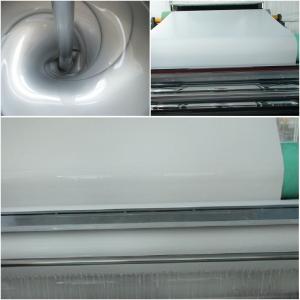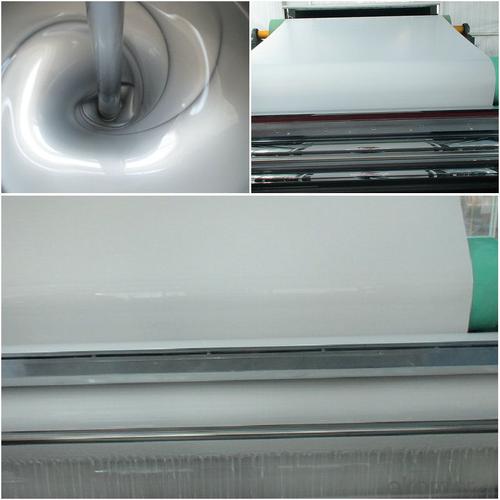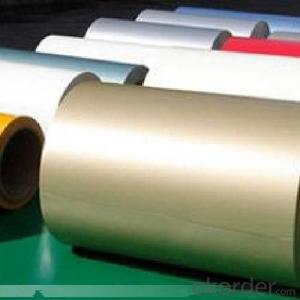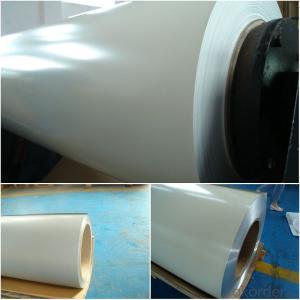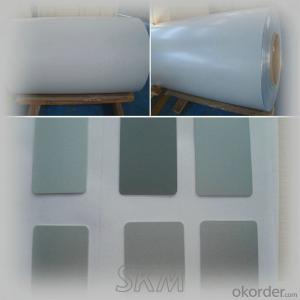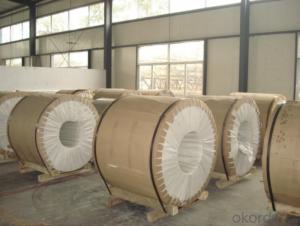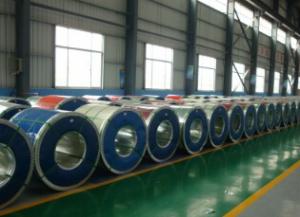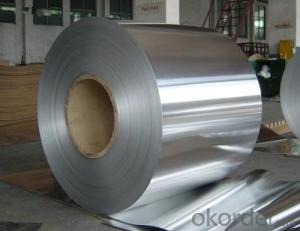Grey Color Back Coated Aluminum Coil Sheet
- Loading Port:
- China Main Port
- Payment Terms:
- TT OR LC
- Min Order Qty:
- -
- Supply Capability:
- -
OKorder Service Pledge
OKorder Financial Service
You Might Also Like
Colorcoated aluminum magnesium alloy Al-Mn
Second, the Al-Mn-Mg alloys thecharacteristics of color coated aluminum
Color coated aluminum magnesiumalloy Al-Mn alloy is used for the 3004 state of the Al-Mn-Mg aluminum alloysubstrate, after de-ester, cleaning, passivation layer processing, and thenpainting on this basis, the international most advanced level of KANAR500 andHYLAR5000 Series Fluorocarbon (PVDF) resin coating, the color coated aluminummanganese alloy known international companies use the U.S. PPG, Sweden and theUnited States Weishi Bo Beca companies paint company, its products by thenatural light exposure, Florida testing, with more than 20 years of weatheringquality assurance. Color coated aluminum magnesium alloy Al-Mn advantages ofraw materials, its products have a high strength, corrosion resistance, highweather resistance and other characteristics, and according to their owncustomers were asked to choose a different color palette, you can colorintegration, can co-exist to gorgeous effect.
Third, Al-Mn-Mg alloys the useof color coated aluminum
Our company specializes inaluminum color coated aluminum manganese alloy has been widely used in largefactories, exhibition halls, stadiums, airports, train station roof and ceilingdecorative envelope system board. Thickness of the aluminum can choosedifferent color coated aluminum magnesium alloy of manganese, by cutting,pressing, punching, bending and other follow-up molding process for large span,the larger the overall roof, wall decorative panels used in construction; Youcan also cut into small panels by bending, stamping mold, etc., for indoordecorative roof plate; also with polyurethane foam, bonded aluminum honeycombcomposite construction for energy-saving decorative wall plates.
Fourth, the development prospects
As the field of buildingdecoration materials, the continuous improvement requirements, as poorperformance of color coated steel corrosion, rust, yellow rust after a largeamount of the deficiency of serious impact on the building's overallappearance, the urgent need to develop a color plate with both strength, butalso overcome the shortcomings of color-coated steel, while there are long-termdurability of new materials, building decoration, used in airports, commercialbuildings, train stations, subways, hospitals and other architecturaldecoration. The Al-Mn-color coated aluminum magnesium alloy materials preciselymeet these requirements, with the expanding domestic demand, strengthen publicinfrastructure under the principle of color coated aluminum magnesium alloy ofmanganese will become an increasingly widespread use of aluminum, a goodprospect.
PEAluminum Coating Coils for ACP
Features of PE Aluminum Sheet:
1. Adopting precision rolling coatingtechnology, our PVDF and PE coated coil can ensure excellent adhesive withoutcoating omission.
2. For the PE coated aluminum coil weproduced, there are various colors for your choice.
3. Using infrared heating technology toprotect environment from pollution.
4. Our coated aluminum coil has four-rollercoating line, uniform coating thickness and good features.
RawMaterial of the PE Aluminum Coating Coils:
1.Aluminum Coil: high strength aluminum with alloy of AA1100 (aluminum alloy isavailable with AA3003, AA3005, AA5005 according to customer)
2. SurfacePaint: PE, PVDF and special paints.
Specificationof PE Aluminum Coating Coil
Width:20mm~1590mm
Thickness:0.06mm~1.0mm
ExternalDiameter: ≤ 1500mm
InternalDiameter: 405mm, 505mm, 150mm, 75mm
Coilweight: ≤ 4000kg
PE coatedaluminum coil is processed through the technics of roller coating and bakingwith precise polyester paints. Its color is glossy and with variety of colorsenabling you to choose easily. Chromatic aberration is small, impact resistanceis strong and easy to be processed, and all its performance has reached orsurpassed the national criteria. The products are widely used in indoor anddoor decoration, ceilings, room surface tiles, corrugated boards, wall panels, advertisement boards, counters,home appliances, decoration in and out of autos and boats.
Performanceof the coating
Aluminum Thickness | Coating Thickness | MEK | T- Bend | Impact | Adhesion | Pencil Hardness | Boiling Water Proof |
0.3-1.5mm | ≥18μm | ≥100 Times | ≤2T | 50 kg•cm | 0 Grade | ≥HB | no change within 2 hours |
0.2-0.28mm | ≥18μm | ≥100 Times | ≤2T | 30kg•cm | 0 Grade | ≥HB | no change within 2 hours |
0.15-0.18mm | ≥18μm | ≥100 Times | ≤3T | 20 kg•cm | 0 Grade | ≥HB | no change within 2 hours |
0.08-0.12mm | ≥16μm | ≥80 Times | ≤4T | 10 kg•cm | ≤1 Grade | ≥HB | no change within 1 hour |
0.022-0.06mm | ≥12μm | ≥50 Times | - | - | ≤1Grade | ≥HB | no change within1 hour |
Colorof Card
PE (polyester)
PE
ColorMatch
For custom' color requests, we can deal as following:
1. Supply a physical sample of custom color. A color sample on metal ispreferred. If other, it is also acceptable. But the color matching rate may benot good as color on metal.
2. New color sample is usually offered by our paint supplier in 5-7 days,special color should be in 7-10 days.
3. Upon receipt of color sample, please approve in writing as soon as possible.Once you approved, we will arrange purchasing and production.
Note: Color difference maybe occurred in different production batch, so it issuggested all panels are placed in one order for same project. And keep samedirection as arrow on protective film when installing to avoid any colordifference by vision
- Q: Are aluminum coils easy to bend and shape?
- Aluminum coils, being a malleable metal, can be easily bent and shaped. This characteristic makes them ideal for various shaping and forming tasks. Different techniques like rolling, bending, or pressing can be employed to manipulate aluminum coils, making them applicable in industries such as construction, automotive, and manufacturing. However, the ease of bending and shaping may vary depending on the specific alloy and thickness of the coil. Thicker coils may necessitate more force and specialized equipment, and different alloys may exhibit varying levels of malleability. In conclusion, aluminum coils present a versatile and relatively uncomplicated material for bending and shaping purposes.
- Q: What is the hardness range of aluminum coils?
- The hardness range of aluminum coils can vary depending on the specific alloy and temper. Aluminum coils can be produced in a wide range of hardness levels, from very soft to very hard. The hardness of aluminum is often measured using the Rockwell or Brinell hardness scales. Soft aluminum coils typically have a lower hardness range, ranging from 20 to 40 on the Rockwell scale. These soft coils are commonly used in applications where flexibility and formability are important, such as packaging, insulation, and electrical wiring. Hard aluminum coils, on the other hand, have a higher hardness range, typically ranging from 40 to 70 on the Rockwell scale. These coils are more rigid and have better mechanical properties, making them suitable for applications that require strength and durability, such as automotive parts, construction materials, and aerospace components. It is important to note that the specific hardness range of aluminum coils can also be influenced by factors such as the rolling process, heat treatment, and alloy composition. Therefore, it is always recommended to consult the manufacturer or supplier for the specific hardness range of the aluminum coils being considered for a particular application.
- Q: Are there any limitations or restrictions on the use of aluminum coils?
- Yes, there are limitations and restrictions on the use of aluminum coils. Some of the main limitations include: 1. Corrosion: Aluminum is prone to corrosion, especially when it comes into contact with certain chemicals or environments. Therefore, it may not be suitable for applications where it will be exposed to corrosive substances or in highly corrosive environments. 2. Strength: While aluminum is a lightweight material, it is not as strong as other metals like steel. This can limit its use in applications that require high strength or load-bearing capabilities. 3. Temperature sensitivity: Aluminum has a lower melting point compared to other metals, which can be a limitation in applications where high temperatures are involved. It may not be suitable for use in certain industrial or high-temperature environments. 4. Electrical conductivity: While aluminum has good electrical conductivity, it is not as conductive as copper. This can limit its use in applications where high electrical conductivity is required, such as in electrical wiring or power transmission. 5. Cost: Aluminum can be more expensive than other metals, limiting its use in applications where cost is a significant factor. In such cases, alternative materials may be preferred. 6. Formability: Aluminum coils can be difficult to form or shape compared to some other metals. This limitation may restrict their use in applications where complex shapes or tight tolerances are required. It is important to consider these limitations and restrictions when selecting aluminum coils for a particular application. Careful evaluation of the specific requirements and constraints will help determine whether aluminum coils are suitable or if alternative materials should be considered.
- Q: Can aluminum coils be painted for custom designs?
- It is indeed possible to paint aluminum coils to achieve personalized designs. The act of painting the coils opens up a world of limitless options for customization and aesthetic appeal. Various colors, patterns, and designs can be applied to the coils, catering to individual tastes and needs. To complete the painting process, the surface must first be cleaned, followed by the application of a primer and the desired paint or coating. Through this method, one can create distinctive and captivating custom designs suitable for a wide array of purposes, including architectural elements, signage, automotive components, and more. Moreover, the paint not only safeguards the aluminum from corrosion but also enhances its durability.
- Q: How do aluminum coils compare to fiberglass coils in terms of weight?
- Aluminum coils are generally lighter in weight compared to fiberglass coils. Aluminum is known for its lightweight properties, making it an ideal choice for various applications, including coil manufacturing. Fiberglass, on the other hand, tends to be denser and heavier than aluminum. This weight difference can have several advantages when it comes to installation and transportation. Lighter aluminum coils are easier to handle, require less effort to install, and can be more cost-effective in terms of shipping and logistics. Additionally, the reduced weight of aluminum coils can contribute to overall energy efficiency in HVAC systems, as it requires less power to move and circulate air through the coils. However, it's worth noting that the weight comparison between aluminum and fiberglass coils may vary depending on the specific design and thickness of the materials used.
- Q: This question asks about the duration an aluminum coil can last before it needs to be replaced or becomes unusable.
- <p>The lifespan of an aluminum coil can vary significantly depending on its application, quality of the material, and environmental conditions. Generally, if properly stored and used, aluminum coils can last for several years without significant degradation. However, in industrial settings where coils are subjected to continuous use and harsh conditions, their lifespan might be reduced to a few years or even less. Regular maintenance and inspection can help extend the lifespan of aluminum coils.</p>
- Q: should i have a paper between aluminum siding and the wood
- Aluminum siding can be vented with round pop-in perforated vent plugs, these are very easy to install. I would really like to know how do you know there is condensation behind your siding?
- Q: Can aluminum coils be used for HVAC ducting?
- Yes, aluminum coils can be used for HVAC ducting. Aluminum is a popular choice for ducting due to its lightweight nature, corrosion resistance, and ability to efficiently transfer heat. It is commonly used in both residential and commercial HVAC systems.
- Q: Can aluminum coils be used in coil coating processes?
- Coil coating processes can indeed utilize aluminum coils. In this automated and continuous process, a protective or decorative coating is applied to a metal coil, typically steel or aluminum. The utilization of aluminum coils in this process is widespread due to their exceptional corrosion resistance, lightweight properties, and ease of shaping. Prior to the actual coating application, these aluminum coils undergo several pre-treatment processes, which include cleaning, chemical treatment, and primer application. Once prepared, a diverse range of materials, such as paints, lacquers, and polymers, are applied to the coils to enhance their appearance, durability, and performance. The coil coating process is highly efficient and consistent, making it an optimal choice for various industries, including construction, transportation, and appliances.
- Q: Can aluminum coils be used in vacuum applications?
- Indeed, aluminum coils are capable of being employed in vacuum applications. Aluminum, being a frequently utilized substance in vacuum systems, possesses exceptional attributes including low outgassing, high thermal conductivity, and commendable corrosion resistance. Consequently, these qualities render aluminum coils suitable for a diverse array of vacuum applications, encompassing, but not restricted to, vacuum chambers, vacuum pumps, cryogenic systems, and particle accelerators. Nevertheless, it is crucial to acknowledge that aluminum may react with particular gases or chemicals. Hence, it is imperative to carefully evaluate the specific necessities and compatibility of the vacuum application prior to employing aluminum coils.
Send your message to us
Grey Color Back Coated Aluminum Coil Sheet
- Loading Port:
- China Main Port
- Payment Terms:
- TT OR LC
- Min Order Qty:
- -
- Supply Capability:
- -
OKorder Service Pledge
OKorder Financial Service
Similar products
Hot products
Hot Searches
Related keywords
